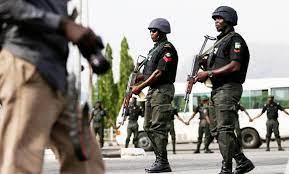Ungoverned Spaces and Alternative Sovereignties in Nigeria: Terror Groups, National Security and Sustainable Development
Main Article Content
Abstract
Nigeria is currently battling with threats that are potent enough to undermine its existence as a sovereign polity. These terrors are coming mostly from groups occupying and controlling diverse ungoverned spaces that littered the country’s landscape. From Boko Haram insurgents, Bandits, herdsmen to ethnic militias; these groups are becoming laws unto themselves and creating spheres of influence and jurisdictions due to government and state apparatus absence. This article examines the conditions that created ungoverned spaces, the activities of diverse groups inhabiting them and the implications on national security and sustainable development. The article adopts qualitative method and relies on secondary data sourced from newspapers, government documents, internet resources and extant scholarly works. The article findings reveal that achievement of the sustainable development goals 1-No Poverty, 2- Zero Hunger, 3-Good Health and Well-being, 4-Quality Education, 6-Clean Water and Sanitation, 8- The interrelatedness of the Sustainable Development Goals and 16- Peace, Justice and Strong Institution are seriously hindered as far as the atmosphere and conditions for peaceful co-existence becomes elusive as various groups continue to contest sovereignty with the Nigerian state. Conclusively therefore, it is recommended that a sustainable national security strategy to ensure peace and reduce conflicts through government presence in the various ungoverned spaces must be pursued.
Article Details

This work is licensed under a Creative Commons Attribution-ShareAlike 4.0 International License.
All writings published in this journal are personal views of the authors and do not represent the views of this journal and the author's affiliated institutions. Author(s) are retain the copyrights of the Article. However, before publishing, it is required to obtain written confirmation from Author(s) in order to ensure the originality (Author Statement of Originality). The statement is to be signed by at least one of the authors who have obtained the assent of the co-author(s) where applicable.This work licensed under a Creative Commons Attribution-ShareAlike 4.0 International (CC BY-SA 4.0)
References
Apau, R. & Banunle, A. (2019). Terrorism, Violent Extremism and Insurgency in the Sahel Region: An Assessment: In Albert, O. & Larry H. African Journal of Terrorism. A Journal of the African Centre for the Study and Research on Terrorism, 1 (9).
Burkey, S. (1993). People First: A Guide to Self-Reliant, Participatory Rural Development. London: Zed Books.
Brundtland Report. (1987). Report of the World Commission on Environment and Development: Our Common Future. http://www.un-documents.net/our- common-future.pdf Assessed 20th August, 2021.
Clunan, A. L. & Trikunas, H. A. (2010). Ungoverned Spaces: Alternatives to State Authority in an Era of Softened Sovereignty. Stanford Security Studies. Stanford, CA: Stanford University Press. Pp. 310.
Edwards, M. (1993). How Relevant is Development Studies?: In Schuurman, F. J. Beyond the Impasse: New Directions in Development Theory. London: Zed Books.
Ibrahim, J. & Dabugat, K. (2016). Rural Banditry and Hate Speech in Northern Nigeria: Fertile Ground for the Construction of Dangerous Narratives in the Media: In Kuna M. J. & Ibrahim J. (eds) Rural Banditry and Conflicts in Northern Nigeria. Centre for Democracy and Development, Pastoral Resolve (PARE) and Nigeria Stability and Reconciliation Programme (NSRP). Abuja
Krasner, S. D. (2004). Governance Failures and Alternatives to Sovereignty. Center on Democracy, Development and the Rule of Law (CDDRL): Stanford Institute on International Studies. Working Paper 1.
Mingst, K. A. (2013). Alternative Governance in Spaces and Territories. Patterson School of Diplomacy and International Commerce. University of Kentucky. International Studies Review. Pp. 285.
Omitola, B. (2016). Transnational Network and Nigerian Security: Challenges of Fulani Herdsmen and Farmers’ Conflict, Annals of Social Sciences, 2(1-2), 60
Okoli, A.C. & Okpaleke, F. N. (2014). Cattle Rustling and Dialectics of Security in Northern Nigeria. International Journal of Liberal Arts and Social Science, 2(3), 109 117.
Onuoha, F. (2008). Oil Pipeline Sabotage in Nigeria: Dimensions, Actors and Implications for National Security. African Security Review, 1(3), 101
Onuoha, F. Gaya, B., & Namri, R. (2010). Jos Crisis and National Security. Nigerian Forum, March/April, 10.
Rabasa, A., Steven B., Peter C., Kim C., Theodore W. K, Jennifer D., Kevin A., & John E. (2007). Ungoverned Territories: Understanding and Reducing Terrorism Risks. Project Air Force. RAND.
Raleigh, C. & Dowd, C. (2013). Governance and Conflict in the Sahel’s. Ungoverned Space. Stability: International Journal of Security & Development, 2 (2): 32. Pp. 1-17, DOI: http://dx.doi.org/10.5334/sta.bs
Risse, T. (2011). Governance without a State? Policies and Politics in Areas of Limited Statehood. New York, NY: Columbia University Press. Pp. 297.
Robert, L. F. (2009). The Root Causes of Terrorism: Why Parts of Africa Might Never Be at Peace. Defense and Security Analysis. 4 (25). Pp. 355–72. DOI: http://dx.doi.org/10.1080/14751790903416707
Suleiman, S. (2019). Rural Banditry in Zamfara State, Northwest Nigeria. Social Science Research Council. Assessed on the 2nd March, 2020 from https://kujenga amani.ssrc.org/2019/06/13/rural-banditry-in-zamfara-state-northwest-nigeria/
Todaro, M. P. & Smith, S. C. (2006). Economic Development. 9th edition. Harlow: Pearson Addison Wesley.
United Nation Sustainable Development Goals Report. (2019). The Sustainable Development Goals Report 2019. https://www.google.com/url?sa=t&source=web&rct=j&url=https://unstats.un.org/sdgs/report/2019/The-Sustainable-Development-Goals-Report 2019.pdf&ved=2ahUKEwiL6d6138brAhWLShUIHf0DDLgQFjAAegQIARAB&usg= OvVaw0csD5mE0xb_7lHm5Z6b9Yy Assessed 20th August, 2020.
